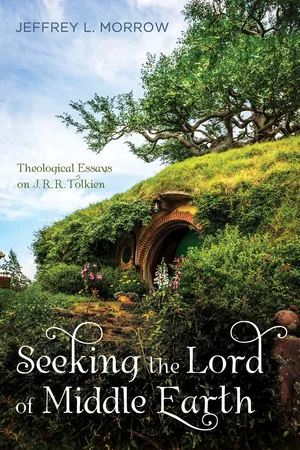![]()
Part I
the influence of christian theology on tolkien
![]()
j. r. r. tolkien’s christianity
J.R. R. Tolkien remains one of the most popular authors of all time, perhaps partly due to the successful Hollywood film editions of The Lord of the Rings and The Hobbit, and partly due to the enduring attraction of his writing. More than twenty years after his death, numerous polls were taken in England on the most important English book of the century, with Tolkien’s The Lord of the Rings trilogy winning hands down on all of these polls. Many in British academia were outraged by these results, arguing that Lord of the Rings was childish and pedantic, in no way comparable to the many classics of great British literature. Even in the twenty-first century, critical rants against Tolkien’s works have continued. The renowned literary critic Harold Bloom confessed, deriding Tolkien’s The Lord of the Rings, “I am not able to understand how a skilled and mature reader can absorb about fifteen hundred pages of this quaint stuff.” We read another literary critic’s complaint, “The Lord of the Rings is much more deep-rooted in its infantilism than a good many of the more obviously juvenile books it influenced. It is Winnie-the-Pooh posing as an epic.” Commenting on this earlier outrage, Joseph Pearce observes, “Rarely has a book caused such controversy and rarely has the vitriol of the critics highlighted to such an extent the cultural schism between the literary illuminati and the views of the reading public.” The popularity of Tolkien appears to be enduring for the near future, but so also does the criticism of that popularity, and Tolkien’s writing.
Nor have literary critics been the only ones to respond negatively to Tolkien’s works. Some Christians, for example, have viewed Tolkien’s books, as well as the Hollywood films, with suspicion, fearing unwholesome influences, perhaps even demonic, stemming from witchcraft and neo-paganism. The universe of Tolkien’s books does not translate easily into an exact parallel of the Christian story, and hence it is possible to fail to recognize the Christian themes, and thus misinterpret the works as a whole. In the face of such criticism, it is good to remember that the great Christian apologist C. S. Lewis was Tolkien’s greatest supporter, clearly seeing no conflict with Tolkien’s writings and Christianity. Writing in a review of Tolkien’s The Lord of the Rings trilogy, Lewis penned the following words: “Here are beauties which pierce like swords or burn like cold iron; here is a book that will break your heart . . . good beyond hope.”
Far from being inherently dangerous, these books are great Christian works that help feed one’s faith, rather than subvert it. As a testimonial, Garrin Dickinson explains these stories’ effect upon his own faith life: “In my ongoing struggle up the path of Christian maturity, Tolkien’s exposition has been my road map.” Pearce urges that Tolkien’s narratives be required reading for Christian families, right alongside Lewis’s Chronicles of Narnia series. I wish to suggest that rather than some occult-influenced fantasy writer, J. R. R. Tolkien was in fact a model Christian writer for our times, a man who preached Christ not only through his writings, but also in his daily life. He was a serious academic who challenged the scholarly community in his field of expertise. And he did this as an informed Roman Catholic Christian, who lived a life passionate for Christ. In short, Tolkien is a man, in whom “we shall discover the soul of a Christian mystic.”
Tolkien’s Early Life
John Ronald Reuel Tolkien was born in South Africa in 1892. Both of his parents died when he was relatively young. First his father died, and then, after she returned the family to England, his mother also died. Before her death, Tolkien’s mother, along with her children, entered the Catholic Church. Previously, they had only a nominal Anglican upbringing, but Tolkien found in the Catholic Church a vigorous Christian faith. The vibrancy in the Catholic Church in England at this time was not a unique experience, limited to the Tolkiens. The Catholic Church in England had in fact been increasing in number and fervor, under the influence of the copious number of well-known converts from Anglicanism, including such eminent figures as John Henry Newman and G. K. Chesterton. Chesterton’s works had a clear effect upon Tolkien, at least indirectly.
After his mother’s death, Tolkien and his younger brother were raised by Father Francis Morgan, an Oratorian priest who became his legal guardian, and among other things, taught the young Tolkien Christian apologetics. Morgan had studied under Newman earlier in life, and this intellectual influence on Tolkien was to be profound. Tolkien’s faith was much more than intellectual, however, and his personal relationship with God began to transcend into all aspects of his life. George Sayer, friend and companion to both Tolkien and Lewis, noted that Tolkien was extremely loyal to the Christian faith Fr. Morgan had instilled in him in his youth. Moreover, “The Christianity he had learned both from his mother and from Father Francis shaped his whole view of life to such an extent that sacrifices were borne willingly, if grudgingly, when they were deemed necessary to the pursuit of virtue.”
Concerning the most significant aspects of his life, Tolkien himself wrote, “And there are a few basic facts, which however drily expressed, are really significant. For instance I was born in 1892 and lived for...


